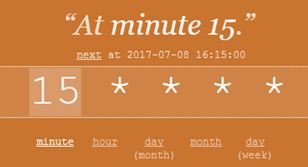Cron
Cron is driven by a crontab (cron table) file, a configuration file that specifies shell commands to run periodically on a given schedule. Cron is a daemon which runs at the times of system boot from /etc/init.d scripts. If needed it can be stopped/started/restart using init script or with command service crond start in Linux systems. The software utility Cron is a time-based job scheduler.
Daemon
Crontab
Crontab is the program used to edit, remove or list the tables. It typically automates system maintenance or administration by maintaining crontab files for individual users. The crontab files are stored where the lists of jobs and other instructions to the cron daemon are kept. Users can have their own individual crontab files located in /var/spool/ and often there is a system-wide crontab file that only system administrators can edit. The origin of the name cron is from the Greek word for time (chronos). cron is most suitable for scheduling repetitive tasks.
There are special cases in which instead of the above 5 fields you can use @ followed by a keyword:
Instead of directly editing the crontab file, you can also add all the entries to a cron-file first.
# crontab -u batman -l
00 12 * * * /home/batman/check-engine-status





Cron is driven by a crontab (cron table) file, a configuration file that specifies shell commands to run periodically on a given schedule. Cron is a daemon which runs at the times of system boot from /etc/init.d scripts. If needed it can be stopped/started/restart using init script or with command service crond start in Linux systems. The software utility Cron is a time-based job scheduler.
Daemon
A daemon is a style of program that runs in the background, instead of underneath the direct management of a user, waiting to be activated by the occurrence of a selected event or condition.
There are 3 basic types of processes in Linux: Interactive, Batch and Daemon. Interactive processes are run interactively by a user at the instruction (i.e., all-text mode). Batch processes are submitted from a queue of processes and aren't related to the command line; they're compatible for performing tasks when system usage is low.
Crontab
Crontab is the program used to edit, remove or list the tables. It typically automates system maintenance or administration by maintaining crontab files for individual users. The crontab files are stored where the lists of jobs and other instructions to the cron daemon are kept. Users can have their own individual crontab files located in /var/spool/ and often there is a system-wide crontab file that only system administrators can edit. The origin of the name cron is from the Greek word for time (chronos). cron is most suitable for scheduling repetitive tasks.
Cron jobs
Cron jobs can be allowed or disallowed for individual users, as specified in the files cron.allow and cron.deny, located in the directory /etc. If the cron.allow file exists, a user must be listed there to be allowed to use a given command. If the cron.allow file does not exist but the cron.deny file does, then a user must not be listed there in order to use a given command. If neither of these files exists, only the superuser will be allowed to use a given command
Syntax
crontab [options]
Options
Options
| -u | Append the name of the user whose crontab is to be changed. If this option is not given, crontab examines "your" crontab, i.e., the crontab of the person executing the command. |
| -l | Display the current crontab. |
| -r | Remove the current crontab. |
| -e | Edit the current crontab, using the editor specified in the VISUAL or EDITOR environment variables. |
| -i | Same as -r, but gives the user a Y/N prompt before actually removing the crontab. |
Fields with allowed values
minute |
0-59 |
hour |
0-23 |
day of month |
1-31 |
month |
1-12 |
day of week |
0-7 (0 or 7 is Sunday) |
Installing crontab from a cron file
Instead of directly editing the crontab file, you can also add all the entries to a cron-file first.
# crontab -u flash -l
no crontab for flash
cat cron-file.txt
@daily /home/flash/ gotoearth38
# crontab cron-file.txt
# crontab –u flash -l
@daily /home/flash/ gotoearth38
This will install the cron-file.txt to your crontab, which will also remove your old cron entries. So, be careful while uploading cron entries from a cron-file.txt.
no crontab for flash
cat cron-file.txt
@daily /home/flash/ gotoearth38
# crontab cron-file.txt
# crontab –u flash -l
@daily /home/flash/ gotoearth38
This will install the cron-file.txt to your crontab, which will also remove your old cron entries. So, be careful while uploading cron entries from a cron-file.txt.
Viewing other user’s crontab entries
# crontab -u batman -l
00 12 * * * /home/batman/check-engine-status
Examples
Running a job every 15 Minutes.
*/15 * * * * /home/ batman/check-engine-status
Running a job every 15 Minutes.
*/15 * * * * /home/ batman/check-engine-status
Running a job every minute.

Running a job every 15th
minute of hour daily.

Running job at 09: 15 on 11th of every month.

Running job at 09: 15 on 11th July.

Running job at 09: 15 on every Sunday in July.



No comments:
Post a Comment